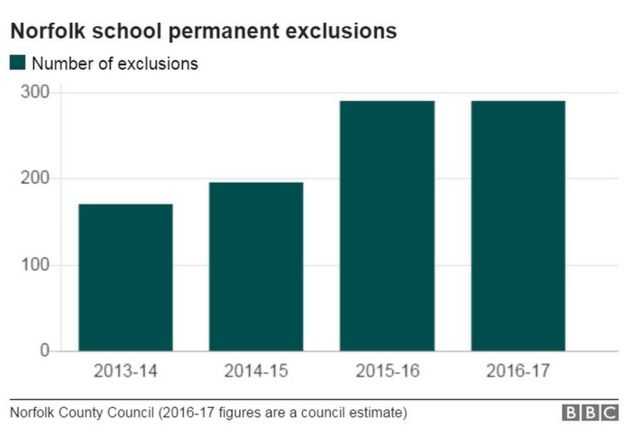
CREDIT: This story was first seen on BBC News
Council figures show 290 pupils were barred in 2015-16, with numbers set to remain the same in 2016-17, BBC News reorts.
The BBC has been told many of the 140 Norfolk children not in schools are being tutored online and at home.
North Norfolk MP Norman Lamb said it was “shameful”. The council said it was funding extra places.
A report to Norfolk County Council’s children’s services committee said there were concerns exclusion were not being used as a “last resort” and instead as a “mechanism for fairly low level behavioural issues”.

Des Reynolds, chief executive of not-for-profit charity Engage Trust, which finds places for excluded pupils at its 10 short stay schools in Norfolk, said: “Currently, the system for providing places for challenging and vulnerable children is under an enormous amount of pressure and there is a shortage of places.
“If children and young people are not in school, that places them in a detrimental position. It’s very important that the authorities work together to find a solution.”
Mr Lamb, a Liberal Democrat MP, said: “I think it is a shameful situation we have in Norfolk.
“I don’t underestimate the challenge some pupils present to schools but I am acutely aware that the consequences of permanent exclusions are so dire.
“Norfolk has a legal obligation to every child to bring down those appalling numbers.”
Figures for 2014/15 show there were 5,800 exclusions nationally.
A Norfolk County Council spokeswoman said: “We commission 290 places per year for pupils who have been permanently excluded, through the Short Stay School for Norfolk. We are aware of a capacity issue and have now commissioned extra funded places.
“We are also working with head teacher associations to reduce exclusions through a new ‘managed move’ process.”
Scott Lyons, of the National Union of Teachers (NUT), said he believed 142 pupils were going without education with excluded pupils from as young as six years to 16.
He said the NUT recognised that teacher should be protected and some pupils needed to be excluded, but he said the “state also has a duty to children”.
The Department for Education said: “Permanent exclusion should only be used as a last resort.
“There are also clear duties in place to ensure suitable, full-time education is put in place for excluded children. We are raising the standards of this alternative provision to ensure every child is given the support they need to achieve their potential.”
Don’t forget to follow us on Twitter, like us on Facebook, or connect with us on LinkedIn!


Be the first to comment